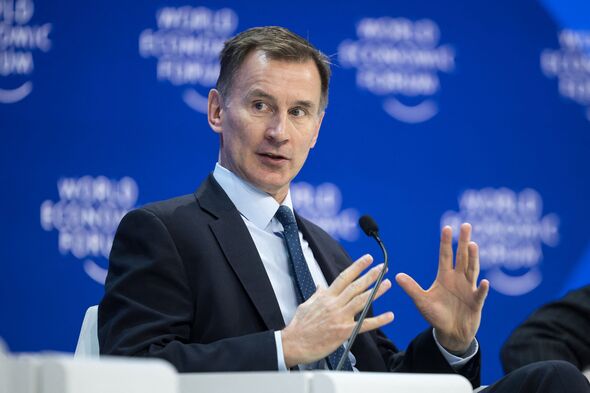
Cost of living pensions hit causes retirement planning misery (Image: Getty)
Almost half of working adults have changed their retirement plans because of the cost of living crisis, new research shows.
A study by the Pensions Management Institute (PMI) shows that, of the 49 percent who have reportedly switched up their plans, 24 percent are set to delay their retirement and 23 percent have reduced their pension contributions.
One in twenty people (five percent) admitted to stopping their pension contributions entirely.
Tim Box, PMI council member, commented: “Our research shows the concerns that many people have about how well they can prepare for retirement.
“With only 30 percent of our respondents believing that the state pension will be more than half of their retirement income, the role of private pension provision to fill the gap is critically important.

The Government are being called to provide more support to retirement savers (Image: Getty)
“If the state pension age is to be raised to 71, as has recently been speculated about, then private pension savings are likely to be the only source of income between stopping work and the commencement of the state pension for a huge swathe of those born after 1970.”
Two-thirds of those surveyed felt that they did not have the knowledge required to choose their pension provider despite nearly 60 percent expressing interest in having that option.
Mr Box highlighted how this underscores the relevance of the Government’s recent lifetime provider (“pot for life”) proposals. These proposals would allow employees to choose their pension scheme, instead of having their employer make that decision for them.
However, based on PMI’s survey results, Mr Box noted the “vital importance” of improving financial and pension education throughout society before implementing such a “radical” change.
According to the study, savers also value retirement benefits in the form of an income stream rather than a cash sum.
Up to 58 percent planned to take retirement benefits totally or mainly as an income with just 25 percent interested in taking their pension savings totally or mainly as cash.
Meanwhile, 81 percent of respondents valued a retirement income that would be guaranteed for life, with two-thirds attracted to an income that kept pace with price inflation.
Mr Box added: “These additional statistics show that it is vital that the Government ensures that savers are given appropriate support and education to save for retirement in an era when it is likely that state pension benefits will only become available in an individual’s eighth decade.”
What could be in store for pensions in the upcoming Spring Budget?
With 2024 being the General Election year, Becky O’Connor, director of public affairs at PensionBee, said the upcoming Budget is far more likely to contain “headline-grabbing giveaways” than painful tax grabs.
- Support fearless journalism
- Read The Daily Express online, advert free
- Get super-fast page loading
She said: “With precious votes to play for, a popular approach is probably to be expected and could mean tax cuts of all kinds, whether income or inheritance tax.”
In regard to pension taxation, Ms O’Connor said: “Further direct changes to pensions taxation seem unlikely. Jeremy Hunt has already made some big, surprise changes to pensions: the abolition of the Lifetime Allowance, the increase to the Annual Allowance from £40,000 to £60,000 and the increase to the Money Purchase Annual Allowance from £4,000 to £10,000.
“If further reform of the tax treatment of pensions is something the Chancellor wishes to look at, introducing a flat rate of tax relief, taxing pension contributions or altering the way National Insurance contributions interact with tax relief are all possible methods that have been considered in a recent Government briefing paper.”
Ms O’Connor said further mention of the Mansion House reforms could be expected, which are designed to channel more pension fund money into UK growth companies.
In particular, Ms O’Connor said: “We would welcome more detail on the kinds of growth assets pension savers’ money would be funnelled into – how much the Government hopes pension funds will invest in the UK and at what cost.
“There might also be further details of dates for when the extension of Automatic Enrolment changes: reducing the minimum age from 22 to 18 and removing the lower limit for the qualifying earnings band for contributions, will come into force.”
There could also be a mention of further developments around other suggested reforms, such as the Lifetime Provider or ‘pot for life’ model. The Government consultation on this proposal closed at the end of January, which could enable the Chancellor to make a further statement on the next steps for this proposal.
According to PensionBee research, more than three-quarters (76 percent) of pension savers said they would consider opting for the new model if it was introduced.”
Finally, regarding the state pension, the Government has already committed to maintaining the Triple Lock guarantee and given the extent to which this benefits older voters, Ms O’Connor said it seems “unlikely” that a review would be initiated now.
She added: “It is possible that calls for earlier access to the state pension for those unable to continue working to state pension age (currently 66) might receive some attention, following the State Pension Age Review 2023, by Baroness Neville-Rolfe, which highlighted the case for this, as this would be a popular move.
“It might also pave the way to further changes to the state pension designed to make it more sustainable.”



